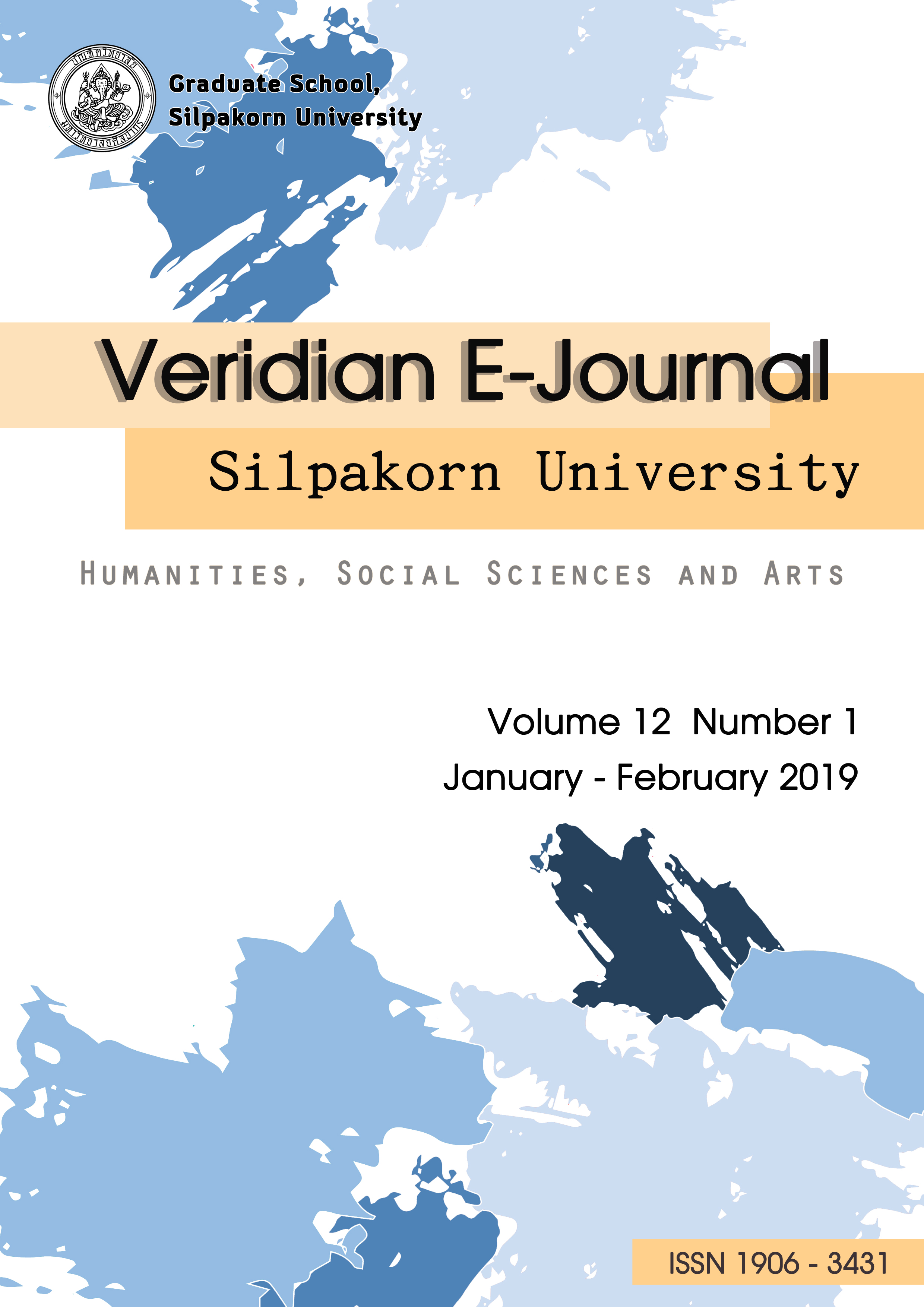การศึกษาแนวทางการพัฒนาบุคลากรสายปฏิบัติการ คณะศึกษาศาสตร์ มหาวิทยาลัยเชียงใหม่โดยใช้กิจกรรมจัดการความรู้ (A Study of Staff Development Guidelines in Faculty of Education, Chiang Mai University by Knowledge Management Activities.)
Main Article Content
บทคัดย่อ
การศึกษาวิจัยในครั้งนี้มีวัตถุประสงค์เพื่อ 1) ศึกษาสภาพ ปัญหาและความต้องการพัฒนาบุคลากรสายปฏิบัติการ และ 2) ศึกษาแนวทางการพัฒนาบุคลากรสายปฏิบัติการ โดยใช้กิจกรรมจัดการความรู้ กลุ่มเป้าหมาย คือ บุคลากรสายปฏิบัติการ สังกัดสำนักงานคณะศึกษาศาสตร์ มหาวิทยาลัยเชียงใหม่ จำนวน 69 คน เครื่องมือที่ใช้ในการวิจัย ได้แก่ แบบสอบถาม แบบสัมภาษณ์ และแบบประเมินประสิทธิภาพของแนวทางการพัฒนาบุคลากร ผลการวิจัย พบว่า สภาพ ปัญหาและความต้องการการพัฒนาบุคลากรมี 4 ด้าน คือ ด้านกำหนดนโยบายและจุดมุ่งหมาย เพื่อการจัดการความรู้ ด้านการจัดโครงสร้างองค์กรของคณะศึกษาศาสตร์ บทบาทและภารกิจของผู้รับผิดชอบแต่ละระดับ ด้านกระบวนการและกิจกรรมการพัฒนาที่เน้นการแลกเปลี่ยนเรียนรู้เพื่อการจัดการความรู้ และด้านการส่งเสริมให้บุคลากรนำความรู้ ทักษะที่ได้จากการพัฒนาไปใช้ในการปรับปรุงงานเพื่อการจัดการความรู้ มีระดับปฏิบัติจริงและระดับปัญหา โดยรวมอยู่ในระดับปานกลาง ส่วนระดับความต้องการ โดยรวมอยู่ในระดับมาก สำหรับแนวทางการพัฒนาบุคลากร สายปฏิบัติการ ควรดำเนินการ ดังนี้ 1) แนวทางการพัฒนาบุคลากร ด้านการกำหนดนโยบายและจุดมุ่งหมาย พบว่า บุคลากรทุกภาคส่วนควรให้ความร่วมมือในการระดมความคิดเห็นและข้อเสนอแนะในการกำหนดนโยบายและจุดมุ่งหมาย เพื่อให้เกิดการยอมรับให้ความร่วมมือ แล้วนำเสนอผู้บริหาร โดยให้ถือเป็นนโยบายจากฝ่ายบริหารหรือผู้บริหารลงสู่การปฏิบัติงานและมีนโนบายเกี่ยวกับการพัฒนาบุคลากรที่ชัดเจน 2) แนวทางการพัฒนาบุคลากรด้านการจัดโครงสร้างองค์กร บทบาท และภารกิจของผู้รับผิดชอบ พบว่า โครงสร้างปัจจุบันซึ่งมีความชัดเจนและเหมาะสมแล้วตามที่มหาวิทยาลัยกำหนดที่มีคณบดี รองคณบดี ผู้ช่วยคณบดี หัวหน้าภาควิชาทั้ง 3 ภาควิชา ผู้อำนวยการโรงเรียนสาธิตฯ เลขานุการคณะศึกษาศาสตร์ หัวหน้างานและหัวหน้าหน่วย มีหน่วยงานที่รับผิดชอบการพัฒนาบุคลากรอย่างชัดเจน ผู้บริหารสนับสนุนในระดับนโยบายก่อนที่จะนำสู่การปฏิบัติ ระดับประสานงานเป็นเลขานุการคณะ และหัวหน้างาน ส่วนระดับปฏิบัติการ คือ บุคลากรภายในหน่วยงาน ส่วนบทบาทและภารกิจของผู้รับผิดชอบแต่ละระดับ บุคลากรทุกคนต้องรับผิดชอบร่วมกันทุกระดับ รู้บทบาทของตนเอง รู้ภารกิจ ความรับผิดชอบ ของตนเองคืออะไร ทุกระดับต้องทำงานในบทบาทของตนเองได้หมดไม่ว่าบทบาทของผู้บริหาร บทบาทของผู้ประสานงาน และบทบาทของผู้ปฏิบัติงาน 3) แนวทางการพัฒนาบุคลากร ด้านกระบวนการและกิจกรรมการพัฒนาการแลกเปลี่ยนเรียนรู้ พบว่า ควรใช้รูปแบบของการประชุม การสัมมนา การฝึกอบรม การเสวนาและการอภิปรายที่เป็นการแลกเปลี่ยนเรียนรู้ และควรทำอย่างสม่ำเสมอ สามารถนำประสบการณ์ในการทำงานมาถ่ายทอดแลกเปลี่ยนแบ่งปันแก่เพื่อนร่วมงานให้เกิดการเรียนรู้ รวมทั้งช่วยกัน หาแนวทางในการแก้ไขปัญหาร่วมกันและเนื้อหาสาระของการพัฒนาบุคลากร ที่ส่งเสริมให้เกิดการแลกเปลี่ยนเรียนรู้ ควรเป็นการพัฒนาทักษะด้านทัศนคติ 4) แนวทางการพัฒนาบุคลากร ด้านการส่งเสริม ให้บุคลากรนำความรู้ ทักษะที่ได้จากการพัฒนาไปใช้ในการปรับปรุงงาน พบว่า ควรมีการประชุมอย่างน้อยเดือนละหนึ่งครั้ง โดยสรุปองค์ความรู้แล้วนำมาเผยแพร่ ประชาสัมพันธ์และ การกำกับติดตาม ให้นำไปใช้ สู่การปฏิบัติจริงหรือประยุกต์ใช้กับงานของตนเองแล้วรายงานกลับมาและหรือนำผลการปฏิบัติมาพูดคุยแลกเปลี่ยนเรียนรู้ เพื่อหาข้อสรุปที่เป็นประโยชน์ต่อการพัฒนางานและมีการทบทวนสรุปองค์ความรู้ที่เกิดจากการพัฒนาบุคลากร สำหรับผลการประเมินแนวทางการพัฒนาบุคลากรโดยรวม พบว่า ทุกด้าน มีความเหมาะสม เป็นไปได้และเป็นประโยชน์ระดับมากถึงมากที่สุด
ABSTRACT
This study was 1) to study the state and problems encountered by and needs of practitioner level personnel, and 2) to study the guideline for practitioner level personnel through knowledge management activities. The target group included 69 practitioner level personnel affiliated with the Office of the Faculty of Education, Chiang Mai University. The research instruments included questionnaire, interview form, and form for assessing the effectiveness of the personnel development guideline. The findings are as follows: First - the state problems and needs for personnel development came up in 4 areas, namely, the policy and objective setting to manage knowledge on setting organizational structure of the Faculty; Second - roles and missions of the responsible persons at each level; Third – development process and activities that focuses on learning sharing leading to knowledge management; and, Fourth – effort to encourage the personnel to implement the knowledge and skills acquired to improve the operation for knowledge management. Implementation and problem encountered were at moderate level while the needs were at high level. The personnel development for practitioner level should be carried out along the following process. Firstly, concerning personnel development in the area of policy and objective settings, it was found that personnel in every part of the organization should provide cooperation in mobilizing ideas and suggestions for setting up the policy and objectives to assure the acceptance leading to cooperation before proposing to the administrators to accept it as the policy on personnel development. Secondly, concerning the personnel development guidelines in the area of setting organizational structure, roles, and missions of the personnel, it was found that the present organizational structure was clear and suitable. As required by the University, there were dean, associate dean, assistant dean, head of each of the 3 departments, Demonstration School director, Faculty’s secretariat, and heads of the task and operational unit. There was an operational unit clearly responsible for personnel development. Administrators provided support for the policy before implementing it. Faculty secretariat and head the operational units played coordinating role. Technical operation was carried out by the personnel in the unit. Roles and mission of the responsible personnel at each level were responsible for by all personnel. At each level, the personnel knew their role and responsibility and were able to actualize their role no matter it was administrative, coordinative, or operative ones. Thirdly, concerning the guideline for personnel development process and activities, it was found that it should be done in term of meeting, seminar, training, conference, and discussion to share learning. All these should be done on regular basis and participants could exchange with their colleagues to learn as well as to help one another in finding the guideline for solving the problem. One of the content areas on personnel development was the affective skill development. Fourthly, concerning personnel development in the area of encouraging the personnel to implement knowledge and skills acquired from the development process to improve their operation, it was found that there should be the meeting at least once in a month and conclude the body of knowledge to disseminate and publicize as well as to monitor it leading to the true practice or applying to their own operation. Afterward, the report on it was created to gain feedback. The results should be used for further task development. Review and conclusion of the knowledge gained from personnel development should be done on regular basis. Lastly, concerning the evaluation on the personnel development guidelines, it was found that every aspect of it was suitability, feasibility, and utility at the most level
Article Details
เอกสารอ้างอิง
การจัดการความรู้มหาวิทยาลัยเกษตรศาสตร์. สืบค้นเมื่อ 8 กุมภาพันธ์ 2559,
จาก https://misweb.csc.ku.ac.th/OASKM/?p=330
พณณกร แก้วดก. (2556). กระบวนการจัดการความรู้ที่มีความสัมพันธ์กับประสิทธิภาพในการปฏิบัติงาน
ของบุคลากร : สำนักงานเลขาธิการคณะรัฐมนตรี. (การค้นคว้าอิสระบริหารธุรกิจมหาบัณฑิต
มหาวิทยาลัยเทคโนโลยีราชมงคลธัญบุรี)
พยอม วงศ์สารศรี. (2534). การบริหารงานบุคคล. (พิมพ์ครั้งที่ 4). กรุงเทพฯ: คณะวิทยาการจัดการ
วิทยาลัยครูสวนดุสิต.
พัชรีวรรณ กิจมี. (2557). การใช้กิจกรรมการจัดการความรู้เพื่อสร้างความตระหนักในการแลกเปลี่ยนความรู้
ของนักศึกษามหาวิทยาลัยฟาร์อิสเทอร์น. เชียงใหม่ : คณะศึกษาศาสตร์ มหาวิทยาลัยฟาร์อิสเทอร์น.
ไพโรจน์ วิริยจาตรี. (2557). การบริหารจัดการทรัพยากรบุคคล มหาวิทยาลัยเชียงใหม่. เชียงใหม่:
มหาวิทยาลัยเชียงใหม่.
รณชิต พฤษกรรม. (2554). การวิเคราะห์ปัจจัยที่ส่งผลต่อการนำนโยบายการจัดการความรู้สู่การปฏิบัติ
ของโรงเรียนระดับมัธยมศึกษา สังกัดสำนักงานคณะกรรมการการศึกษาขั้นพื้นฐาน.
(วิทยานิพนธ์ครุศาสตรดุษฎีบัณฑิต, จุฬาลงกรณ์มหาวิทยาลัย).
ศศิวิมล ว่องวิไล, ธนินทร์ รัตนโอฬาร และกฤษณา คิดดี. (2558). การวิเคราะห์องค์ประกอบของกระบวนการ
จัดการความรู้ของมหาวิทยาลัยในกำลับของรัฐ. วารสาร Veridain E Journal, Slipakorn
University. ปีที่ 8 ฉบับที่ 3 (กันยายน-ธันวาคม) : 811-829.
เสถียร เหลืองอร่าม. (2533). การบริหารงานบุคคล. : ม.ป.พ.
อารักษ์ วงศ์วรชาติ. (2552). การจัดการความรู้คืออะไร. สืบค้นเมื่อวันที่ 13 มิถุนายน 2561
จาก https://www.gotoknow.org/posts/286433
อุไรรัตน์ ชนะบำรุง. (2561). บทบาทของผู้บริหารกับการจัดการความรู้. สืบค้นเมื่อวันที่ 20 มิถุนายน 2561
จาก https://www.gotoknow.org/posts/511888

